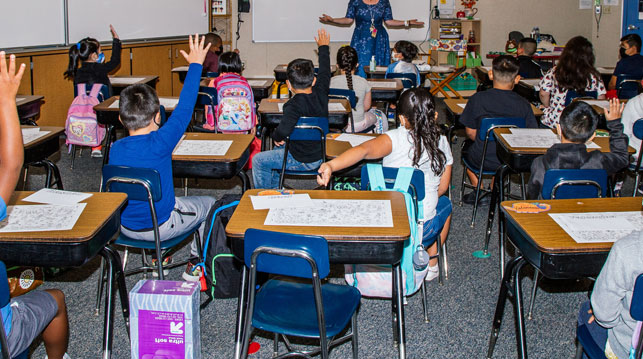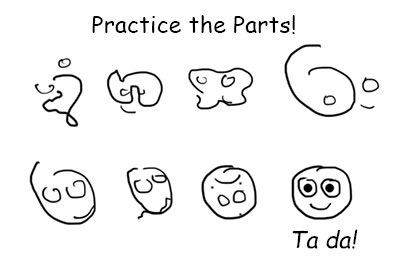
When I am not wearing my proofreader hat, I am often found wearing my teacher hat, specifically my fifth grade teacher hat. In the school district where I work, the COVID pandemic has caused some significant shuffling of positions to balance demand for primarily synchronous/Zoom online learning (with the intention to return in person as soon as it’s safe) with demand for virtual, primarily asynchronous, learning. Thus, I found myself assigned the task of teaching fifth grade starting in September, specifically language arts and social studies. (My teaching partner handles math and science.)
After freelance proofreading, editing, and writing and doing small-group literacy and math intervention for the past nine years, I find teaching ten-year-olds reading and writing this year a fascinating, eye-opening, and challenging experience. Reflecting on lessons I’ve learned teaching kids to write this fall, I realized that what my students struggle with is what writers of all ages struggle with, just at a different level. In today’s post, I’ll share four relatable lessons about writing.
Get a free sample proofread and edit for your English document.
Two professional proofreaders will proofread and edit your English document.
In elementary school language arts curricula, reading and writing go hand-in-hand. We study what we call mentor texts. For example, when we are working on personal narrative in writing, we look at first-person realistic fiction with strong character development in reading. Our reading lessons are foundational to our writing lessons.
For writers of all ages, this is important. If your goal is to become a better science writer, read a lot of high-quality science writing. If your goal is to become an award-winning novelist, read a lot of award-winning novels in a genre you can easily relate to the sorts of topics you are interested in yourself. You can learn a lot about effective writing in your field by examining the finished products of others.
The bane of my writing teacher existence is, “I don’t have anything to write about.” When I hear those words, I know what follows is likely to be frustrating for me and the student in question; saying aloud that there’s nothing to write about shuts down the part of kids’ brains that comes up with ideas. It can take a lot of encouragement on my part to get that part of the brain switched back on again.
All writers can struggle mightily with the got-no-topic issue. If you don’t have a patient fifth grade teacher encouraging you as you decide on a writing topic, be your own coach. Explore possibilities in your mind, ask yourself questions related to the assignment. If writing about literature, look through the relevant material you find most interesting. If writing a research paper, explore parts of the topic that catch your eye. Brainstorm a list of possible ideas or look through texts on the general topic you are to write about. Just don’t succumb to the dreaded, “I don’t have anything to write about.”
I have yet to teach my fifth graders how to do an outline, but we do talk a great deal about the organization of a piece of writing. At this point, we have not evolved beyond the five-paragraph essay (Quite a few students are stuck at the three paragraph essay or the two paragraph blob of ideas phases.), but imagining and making explicit the sequence of main parts of a piece of writing is key, especially for young writers.
For more experienced writers, an outline can be a great step in the writing process. Even a simple list of main points can help keep you on track and keep moving forward when the overall process seems daunting. Checking off items on an outline or list as you go can help make writing much more manageable. To know where you’re headed, create a map so you can see the destination before you start.
In fifth grade, we study common letter patterns that combine to form words, what makes a complete sentence, types of sentences, how to form a paragraph with a topic sentence and support, informational text features like headings and tables, and other components of a larger writing assignment. We repeat these conversations because they are not the sort of things you discuss once and move on.
Considering all that goes into writing an essay or paper (or a book or script), it is clear writing is a highly demanding task, cognitively speaking. Decisions about choosing appropriate words, staying on topic, effectively making transitions, being logical and making sense, and ensuring that the whole makes some sort of point is a lot for the human brain to handle, so break down a writing assignment into its parts whenever you can. When possible, study and practice the parts of the process you find most challenging on their own, so when it comes to using them in an assignment you are ready to do so correctly.

A final thought: Patience is key. From the beginning to the ending of a writing project, I’ve got to keep reminding students that writing is a complicated process that they can do and will get better at with hard work. If you’re working on a challenging writing project, you’d do well to remind yourself of this as well.
Sarah P.
Get a free sample proofread and edit for your English document.
Two professional proofreaders will proofread and edit your English document.
Get a free sample proofread and edit for your document.
Two professional proofreaders will proofread and edit your document.
We will get your free sample back in three to six hours!